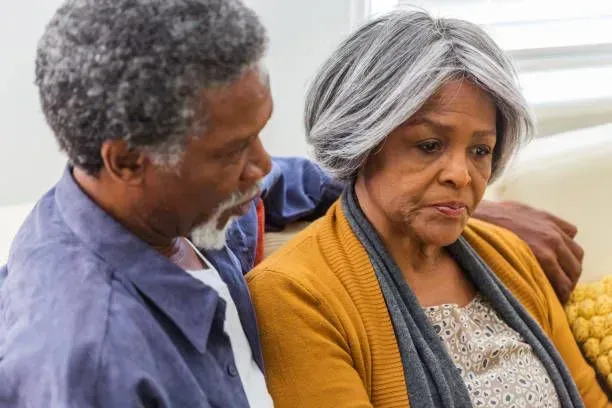6 Tips for Noticing Senior Depression
6 Tips for Noticing Senior Depression
At 7 Day Home Care, we understand the critical importance of recognizing the signs of depression in elderly loved ones. Early detection can significantly improve their quality of life by allowing for timely intervention and support. Depression in seniors often goes unnoticed as its symptoms—such as withdrawal from social activities, changes in appetite, or unexplained physical complaints—are sometimes mistaken for normal aging. By staying vigilant and identifying these signs, families and caregivers can take proactive steps to ensure the emotional well-being of their elderly loved ones, fostering a healthier, happier, and more fulfilling life.

Depression in Elderly Individuals is Widespread
In today's fast-paced world, it's easy to overlook the mental health struggles that elderly loved ones may face, particularly when it comes to depression. As people age, life changes and challenges can lead to feelings of isolation, sadness, and hopelessness. It's crucial to recognize these signs and take proactive steps to prevent elderly depression, ensuring the overall well-being of seniors. This guide will highlight the importance of identifying depression in older adults and provide effective strategies for prevention.
Understanding Elderly Depression: A Growing Concern
Depression in elderly individuals is a widespread but often underdiagnosed issue. According to the National Institute of Mental Health (NIMH), more than 6.5 million adults aged 65 and older in the United States experience depression. However, only a small portion of these cases are correctly identified and treated. This underscores the importance of increased awareness and vigilance among family members and caregivers.
Recognizing the Signs of Depression in Seniors
Recognizing depression in elderly loved ones can be challenging, as it often presents differently than in younger individuals. Here are key signs to watch for:
Changes in Behavior: Noticeable shifts in daily routines, sleeping patterns, and eating habits may indicate emotional distress.
Persistent Sadness: Frequent expressions of sadness, hopelessness, or emptiness could be strong indicators of depression.
Social Withdrawal: Avoiding social interactions or withdrawing from hobbies and activities they once enjoyed can signal depression.
Physical Complaints: Depression often manifests in physical symptoms such as unexplained aches, pains, or fatigue.
Cognitive Decline: Difficulty concentrating, memory problems, or struggles with decision-making may be related to depression.
Neglect of Personal Care: A sudden decline in personal hygiene and grooming is another warning sign.
Effective Strategies for Preventing Depression in the Elderly
To help prevent depression in elderly loved ones, it’s important to adopt holistic approaches that foster emotional, mental, and physical well-being. Here are some practical prevention strategies:
Maintain Social Connections: Encourage regular interactions with friends, family, and support groups to combat feelings of loneliness and isolation.
Promote Physical Activity: Regular exercise can improve mood and reduce the risk of depression.
Focus on a Healthy Diet: A balanced, nutrient-rich diet can positively affect mental health and reduce the risk of depression.
Encourage Mindfulness and Relaxation: Practices like meditation, deep breathing, and yoga can help seniors manage stress and enhance emotional well-being.
Engage in Enjoyable Hobbies: Pursuing favorite activities can foster a sense of accomplishment and purpose.
Seek Professional Help: Regular check-ups with healthcare providers can help identify depression early, ensuring timely intervention.
Consider Home Care Services: Companies like 7 Day Home Care offer in-home care services that provide companionship, assistance with daily tasks, and emotional support, significantly reducing the risk of loneliness and depression.
The Role of Home Care in Supporting Elderly Mental Health
Depression in elderly individuals is a serious issue that requires careful attention. 7 Day Home Care is dedicated to providing specialized care that goes beyond physical assistance. By focusing on companionship and emotional well-being, we aim to improve the quality of life for elderly individuals. Our team serves seniors in Manhattan, Brooklyn, Queens, Nassau County, and Suffolk County, New York, offering services designed to enhance mental, emotional, and physical well-being.
Why Early Detection and Prevention Matter
By understanding the signs of depression and taking proactive steps to prevent it, we can make a meaningful difference in the lives of elderly loved ones. Whether through regular social engagement, professional help, or home care services, there are many ways to support the mental health of seniors.
At 7 Day Home Care, we stand as a pillar of support, committed to ensuring that seniors lead lives filled with joy, purpose, and fulfillment. Together, families and caregivers can recognize and prevent depression, creating brighter tomorrows for their elderly loved ones.
Learn More About 7 Day Home Care
Take the first step in ensuring your elderly loved ones receive the care and emotional support they need to thrive. 7 Day Home Care is licensed by the New York State Department of Health to provide home care services in Manhattan, Queens, Brooklyn, Nassau County, and Suffolk County, New York. To learn more about our home care services, please call 516-408-0034.
Brian Callahan
7 Day Home Care
Helpful Resources on Elderly Depression:
National Institute of Mental Health (NIMH): "Older Adults and Depression"
Mayo Clinic: "Depression in Older Adults: 7 Ways to Help"
HelpGuide: "Depression in Older Adults and the Elderly"
National Council on Aging: "Depression"
World Health Organization (WHO): "Depression"










